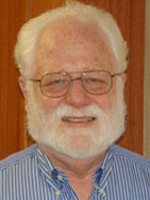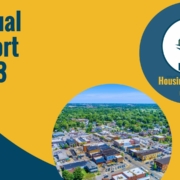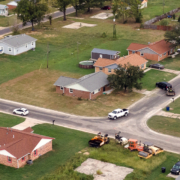For over fifty years, the Housing Assistance Council has empowered rural communities with the resources they need to overcome their greatest housing challenges. That entire time, HAC’s Board of Directors has guided our approach and kept us true to our mission. Our board members have always represented the communities we work with across the country. The expertise they bring has proven invaluable time and time again.
At the National Rural Housing Conference in October 2023, we honored two long-time board members by presenting them with Rural Housing Service Awards as thanks for their combined 66 years of service to HAC. As they transitioned off the board, we asked Maria Luisa Mercado and Gideon Anders to reflect on the past, present, and future of HAC.
Maria Luisa Mercado, Lone Star Legal Aid
Galveston, Texas

Thirty-six years ago, when she was working as an assistant attorney general for consumer protection in Lubbock, Maria Luisa got a call from a colleague who said she’d be an ideal board member at HAC. For Maria Luisa, who grew up as a farmworker, “serving on a housing board, especially one with a rural focus, was really exciting.”
Housing is the core of what HAC does, but she explains that the real goal has always been to serve people and communities. After all, she says “if you can stabilize someone’s housing, you can change their life.” Staying true to this mission has been the core of HAC’s success, she argues. Over the last three decades, Maria Luisa has visited many of the communities with which HAC works, and the impact of our work is always clear. “You can concretely see the results: changing the life of someone,” she notes.
Looking to the future, Maria Luisa believes the defining challenge of the next few decades will be developing novel ways of encouraging the development of new affordable housing groups. As we expand the communities that we serve and develop new partners, building their capacity to make the most of the resources available to them will be crucial. She imagines a future in which HAC has expanded from a focus on housing to include community development and building the capacity of local communities and governments to access state and federal resources.
HAC has always been at the forefront of efforts to support rural communities’ housing and to bring attention to overlooked rural places. “It matters because rural America,” says Maria Luisa “if no one pays attention, is isolated from services.” And those services, like housing investment, are what any community needs to thrive. After more than five decades of serving rural America, Maria Luisa is proud to say that “HAC is still standing.”
Gideon Anders, Retired (formerly National Housing Law Project)
Oakland, California

Gideon Anders was hired by HAC in 1972—fewer than 8 months after we were founded. As Gideon explains, the HAC of 1972 was still figuring out how to operate: “we did a lot of things by the seat of our pants.” Quickly, though, we established the processes that HAC continues to build on to this day. “Our work is much more effective and reaches out to more organizations” than it once did, Gideon notes.
For the entirety of his time with HAC—both as a staff member and in his 30 years as a board member—something that hasn’t changed is that “there’s no one else providing the assistance that HAC is.” For example, we were one of the first organizations to offer predevelopment lending in rural communities, and our research—especially our flagship publication Taking Stock—fills a void in data and analysis about rural housing.
HAC is still providing resources to rural communities that few others do. To Gideon, HAC’s focus on the preservation of multifamily rental homes in the USDA’s Section 515 program is a key example of the “critical services which no one else is providing on the scale HAC is.” In 2022, for example, HAC closed a $7.8 million loan to Northwest Coastal Housing so they could purchase and preserve Golden Eagle II, a 33-unit USDA Section 515 property. Without our financing, the original property owner would have prepaid his USDA mortgage, making his tenants ineligible for the rental assistance they’d received for decades. But, thanks to this loan, Golden Eagle is staying in the program and the tenants will retain their affordability protections for decades.
Looking to the future, Gideon imagines a HAC that is bringing together organizations of all kinds to collectively make the argument that housing is central to individual and national prosperity. Our homes touch every other part of our lives, which is why Gideon wants to see these coalitions include community service providers of all stripes, including those focused on health. After all, when it comes to the impact on someone’s health, Gideon believes “quality housing comes next to healthcare.”
A lot has changed at HAC over the last 50 years. However, Gideon notes that, “fundamentally, the services HAC was providing in 1971 are still what we’re doing today. But the scope has grown tremendously.”





